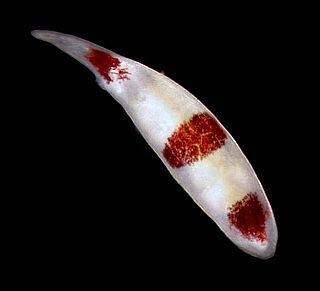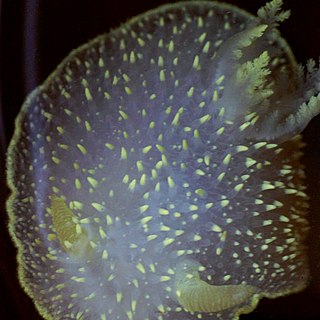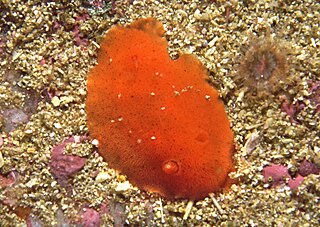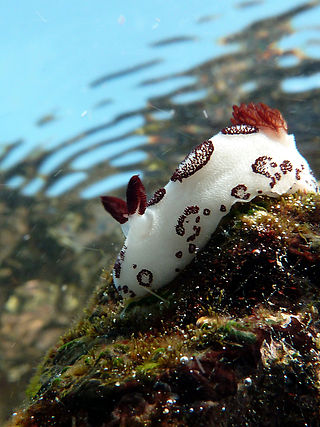
The Prolecithophora are an order consisting of an estimated 300 species of small, active, aquatic flatworms. The order lacks a common English name. Most species are shaped like an elongated, stylized droplet, and are opaque white or yellow; they frequently have contrasting bands or spots in colors, such as purple, yellow, red, or brown. They have no to three pairs of pigment-cup eyes, and well-developed tactile and chemoreceptor senses. With few exceptions, species are protandric hermaphrodites with internal fertilization. Egg capsules are, according to species, glued to various hard surfaces; the young hatch as miniature copies of their parents.

Chromodorididae, or chromodorids, are a taxonomic family of colourful, sea slugs; dorid nudibranchs, marine gastropod mollusks in the superfamily Doridoidea. “Chromodorid nudibranchs are among the most gorgeously coloured of all animals.” The over 360 described species are primarily found in tropical and subtropical waters, as members of coral reef communities, specifically associated with their sponge prey. The chromodorids are the most speciose family of opisthobranchs. They range in size from <10mm to over 30 cm, although most species are approximately 15–30 mm in size.

The Pleurobranchidae are a taxonomic family of sea slugs, marine gastropod molluscs in the clade Pleurobranchomorpha.

Doto is a genus of sea slug, a nudibranch in the family Dotidae. This genus feeds on hydroids, as reflected by its serrated radula.

Acanthodoris is a genus of sea slugs, dorid nudibranchs, shell-less marine gastropod mollusks in the family Onchidorididae. The genus is believed to have originated in the Atlantic Ocean in the Cretaceous period and spread to the Pacific Ocean. The relationships of Acanthodoris to the other genera in the family Onchidorididae were evaluated by molecular phylogeny in 2015.

Cadlina is a genus of sea slugs, dorid nudibranchs, shell-less marine gastropod mollusks historically classified in the family Chromodorididae. Recent research by R.F. Johnson in 2011 has shown that Cadlina does not belong to the family Chromodorididae. She has therefore brought back the name Cadlinidae from synonymy with Chromodorididae. The family Cadlinidae also includes the genus AldisaBergh, 1878.

Discodorididae is a taxonomic family of sea slugs, specifically dorid nudibranchs, marine gastropod mollusks in the superfamily Doridoidea.

Jorunna is a genus of sea slugs, dorid nudibranchs, shell-less marine gastropod molluscs in the family Discodorididae.

Acochlidiacea, common name acochlidians, are a taxonomic clade of very unusual sea snails and sea and freshwater slugs, aquatic gastropod mollusks within the large clade Heterobranchia. Acochlidia is a variant spelling.

The Doridina, common name dorid nudibranchs, are a taxonomic suborder of sea snails or slugs, marine gastropod molluscs in the order Nudibranchia. Bouchet & Rocroi (2005) rejected the name Anthobranchia on the grounds that it also included Onchidium at the time of original publication. Doridina is equivalent and used in the latest classification.

Fionoidea is a superfamily of small sea slugs, aeolid nudibranchs. They are gastropod mollusks within the infraorder Cladobranchia. The families within Fionoidea were shown to be monophyletic on DNA evidence and a re-interpretation of family characteristics was provided.

The Facelinidae are a taxonomic family of colorful sea slugs. These are specifically aeolid nudibranchs. They are marine gastropod molluscs.

Parhedylidae are a taxonomic family of sea slugs, marine gastropod mollusks in the superfamily Parhedyloidea.
Actinoposthiidae is a family of acoels.

Cymbula oculus is a species of sea snail, a true limpet, a marine gastropod mollusk in the family Patellidae, one of the families of true limpets.

Cadlinidae is a family of sea slugs, dorid nudibranchs, marine gastropod mollusks in the superfamily Doridoidea.

Sclerodoris is a genus of sea slugs, specifically dorid nudibranchs. They are marine gastropod molluscs in the family Discodorididae.

Acotylea is a suborder of free-living marine turbellarian flatworms in the order Polycladida.
Notoplana vitrea is a species of free-living marine flatworm in the family Notoplanidae. It is found in the Mediterranean Sea and the Black Sea.
Notoplana acticola is a species of flatworms that belongs to Turbellarians. The flatworm is one of the most primitive flatworm that has a brain. This species has the ability to consume prey without a brain present. There is no specific evidence on what the flatworms eat regularly, but some research shows that they may eat limpets. Notoplana acticola are able to ingest food at a rapid rate. Research shows a normal flatworm can ingest one brine shrimp in less than a minute and eat up to 5 shrimp. The amount of shrimp consumed by a decerebrated flatworm is different due to the lack of control.
















